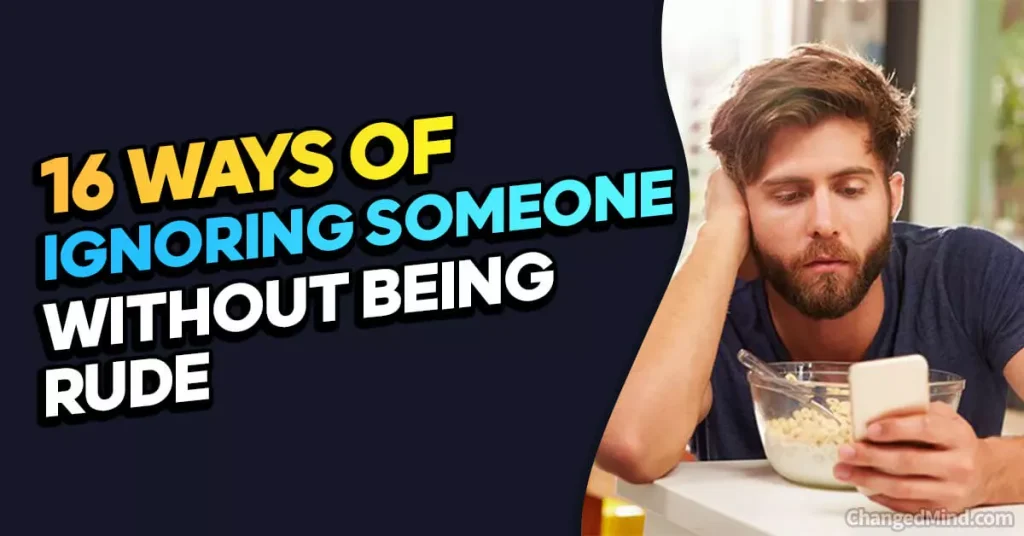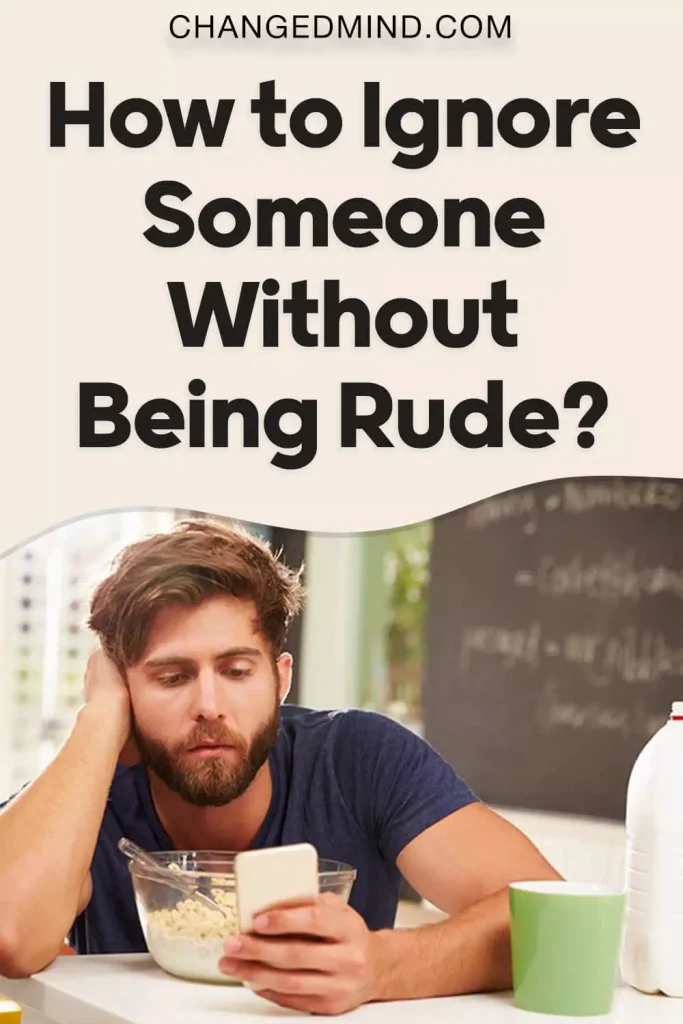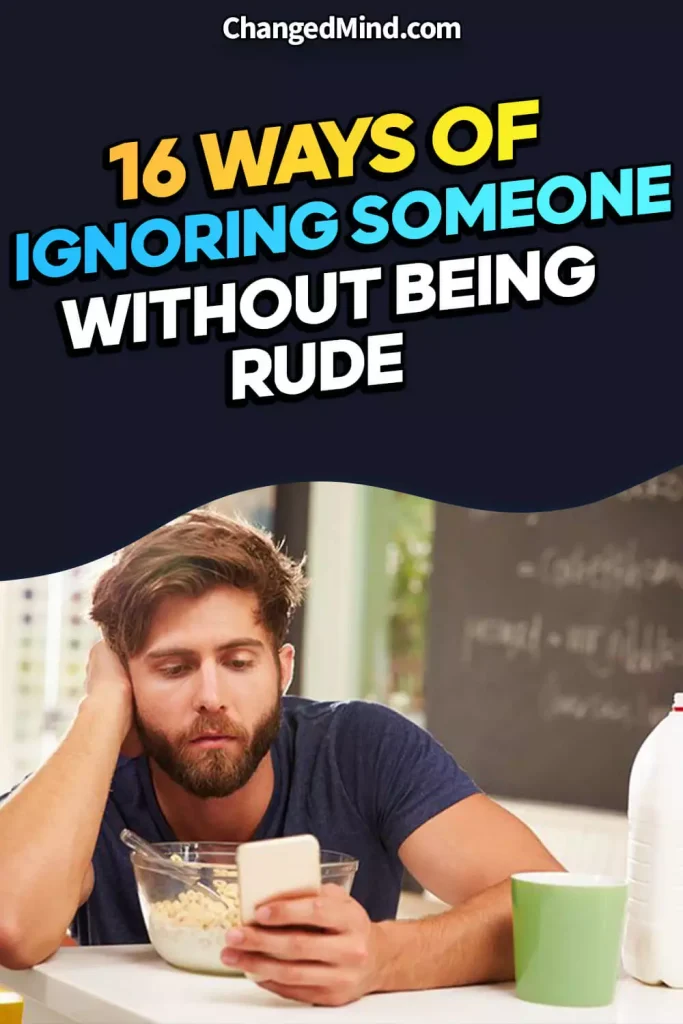We’ve all been there, caught in the crossroads of wanting to escape a conversation without invoking the wrath of Miss Manners. Fear not, social ninjas, for we’ve brewed up a potion of subtle evasion and polite distraction in our enchanting guide: “16 Ways of How to Ignore Someone Without Being Rude.”
From the art of skillful topic-switching to mastering the vanishing act without leaving traces, this article is your Hogwarts letter to the realm of gracious ignoring. But why should you read on? Well, because unicorns might not be real, but dealing with delicate situations without burning bridges definitely is.
Ready to perfect the art? Abracadabra, let’s dive in!
Short Answer: Ever wished for a guide on how to perform social disappearing acts without becoming the Houdini of rudeness? Say hello to “How to Ignore Someone Without Being Rude.” We’re about to unveil 16 enchanting ways that let you slip out of conversations while keeping your halo intact.
In this article, we’ll cover:
- The magic of non-verbal cues.
- Conversational escapes for the sly.
- Techno-wizardry: Using gadgets as allies.
- The vanishing act with a twist.
- Crafting believable excuses with finesse.
Ignoring someone without being rude can be a challenging task, especially in situations where you need to maintain your composure and respect.
Understanding the importance of ignoring someone is the first step in navigating this delicate balance. There can be various reasons why you might want to ignore someone, such as dealing with toxic or negative individuals, the need for personal space or privacy, or avoiding conflict and unproductive conversations.

To ignore someone without being rude, there are several strategies you can employ. Setting boundaries is essential, clearly communicating what you are comfortable with and what your limits are. Redirecting the conversation can help shift the focus and avoid engaging with the person. Using non-verbal cues, such as body language or facial expressions, can subtly convey your disinterest.
Practicing active listening with disengagement demonstrates that you are present but not actively participating in the conversation. Limiting your availability and being clear and direct in your communication can also be effective strategies.
It’s important to consider the emotional impact of ignoring someone. You may experience feelings of guilt or question your actions. Taking care of your emotional well-being and practicing self-care becomes crucial during this process.
In some cases, ignoring someone may not be enough, and it may be necessary to seek additional support or mediation. This can be particularly relevant when dealing with persistent or harmful behavior.
By understanding the importance of ignoring someone, employing appropriate strategies, and considering your emotional well-being, you can navigate these situations with grace and minimize any potential conflicts.
Key takeaway:
- Understanding the importance of ignoring someone: Ignoring someone can be necessary to protect your own well-being and maintain healthy boundaries.
- Why would you want to ignore someone?
- Dealing with toxic or negative individuals: Ignoring such individuals can help in avoiding their harmful influence and maintaining peace of mind.
- Need for personal space or privacy: Ignoring someone can be a way to safeguard your personal space and privacy.
- Avoiding conflict or unproductive conversations: Ignoring someone can prevent unnecessary conflicts and unproductive engagements.
- How to ignore someone without being rude?
- Set boundaries: Clearly communicate your limits and expectations to the person you want to ignore.
- Redirect the conversation: Shift the focus of the conversation to a more neutral topic or politely disengage from it.
- Use non-verbal cues: Avoid eye contact, keep your body language distant, or disengage physically to indicate your desire to be left alone.
- Practice active listening with disengagement: Politely listen, but refrain from engaging in the conversation or offering any input.
- Limit your availability: Reduce the time and opportunities for interaction with the person you want to ignore.
- Be clear and direct: If necessary, assertively express your intention to ignore the person without being rude or disrespectful.
- Dealing with the emotional impact of ignoring someone
- The guilt factor: Understand that it’s okay to prioritize your mental and emotional well-being over someone who is causing harm or negativity.
- Self-care and emotional well-being: Take care of yourself by engaging in activities that promote positivity and reducing stress caused by ignoring someone.
- When to seek additional support or mediation: If the situation escalates or becomes unbearable, consider seeking professional help or mediation to resolve conflicts.
Understanding the Importance of Ignoring Someone

Understanding the importance of ignoring someone is crucial for maintaining healthy relationships and personal well-being. Ignoring someone is not being rude, but rather a strategy to protect oneself or maintain boundaries. Here are a few reasons why understanding the importance of ignoring someone can be significant:
1. Respect personal space: Understanding the importance of ignoring someone protects personal space and boundaries, allowing individuals to control their emotions and well-being without unnecessary conflicts.
2. Preserve mental and emotional health: Understanding the importance of ignoring someone provides relief and peace of mind, distancing individuals from toxic influences, reducing stress, and promoting mental well-being.
3. Avoid conflicts: Understanding the importance of ignoring someone prevents conflicts and arguments. It is better to let go of certain situations or individuals instead of engaging in unproductive arguments that bring negativity.
4. Focus on personal growth: Understanding the importance of ignoring someone helps individuals focus on personal growth and aspirations. By redirecting attention and energy towards positive endeavors, individuals can enhance skills, pursue goals, and cultivate a fulfilling life.
5. Maintain self-respect: Understanding the importance of ignoring someone is an act of self-respect. It allows individuals to prioritize their own needs and values, refusing to be disrespected or manipulated by others.
6. Preserve relationships: Understanding the importance of ignoring someone can benefit relationships. Giving space allows both parties to reflect, re-evaluate actions, and work towards healthier communication and understanding.
Understanding the importance of ignoring someone is not about being rude or dismissive but about prioritizing oneself and promoting healthy boundaries. It is crucial to evaluate each situation carefully and consider potential consequences before deciding to ignore someone.
By doing so, individuals can maintain their well-being, foster positive relationships, and cultivate personal growth.
Why Would You Want to Ignore Someone?
Have you ever wondered why it becomes necessary to ignore someone in certain situations? In this section, we’ll explore the reasons that may lead us to choose to ignore others.
From dealing with toxic individuals to the need for personal space and privacy, or even avoiding conflict and unproductive conversations, understanding these motivations can help us develop strategies for maintaining healthy boundaries and ensuring our own well-being.
So, let’s dive into the various circumstances where ignoring someone without being rude becomes a valuable skill.
Dealing with Toxic or Negative Individuals
Recognize the signs: Identify toxic or negative individuals in your life by looking for behaviors like constant criticism, manipulation, belittling, or excessive negativity.
Set boundaries: Protect your mental and emotional well-being by establishing clear boundaries with toxic individuals. Clearly communicate which behaviors are unacceptable and enforce consequences if needed.
Limit interactions: Minimize time spent with negative individuals. Engage with them only when necessary and avoid getting drawn into their negativity.
Preserve your mental peace: Surround yourself with positive influences and focus on joyful activities to counterbalance the impact of toxic individuals.
Be polite but firm: When dealing with negative individuals, stay calm and assertive. Avoid becoming defensive or getting into arguments.
Dealing with toxic or negative individuals can be challenging. By recognizing the signs, setting boundaries, limiting interactions, preserving your mental peace, and responding in a polite but firm manner, you can effectively manage these relationships while safeguarding your well-being. Seeking support from friends, family, or professionals can be beneficial in navigating these relationships.
Need for Personal Space or Privacy
When it comes to personal space and privacy, it is important to prioritize and communicate your boundaries. Here are some key points to consider in order to fulfill your need for personal space or privacy:
1. Set boundaries: Take the time to define personal space and privacy for yourself. Understand your comfort level for interaction and engagement, and clearly communicate these boundaries to the person you want to ignore. Make sure they understand your need for personal space.
2. Limit interactions: Reduce the frequency and duration of your interactions with the person. This will help create distance and maintain your mental peace. Politely but firmly decline invitations or requests for your time and attention.
3. Preserve privacy: Safeguard your personal information by avoiding sharing sensitive details with individuals you want to ignore. This will help maintain your privacy and minimize unwanted intrusions.
4. Redirect the conversation: If the person tries to discuss topics that make you uncomfortable, guide the discussion towards neutral or more appropriate subjects. Assertively steer the conversation towards areas that respect your need for personal space or privacy.
5. Use non-verbal cues: Non-verbal cues play a significant role in expressing your desire for personal space. Keep a respectful distance, use body language to convey disinterest or boundaries, and avoid prolonged eye contact.
Remember, it is crucial to prioritize your well-being and emotional health. Ignoring someone without being rude means taking care of yourself while respecting others’ boundaries. By setting boundaries and communicating your need for personal space or privacy, you can achieve a healthier and more balanced interaction with others.
Sometimes the best way to avoid conflict or unproductive conversations is to pretend you lost your voice.
Avoiding Conflict or Unproductive Conversations
- Set boundaries: It is important to clearly communicate your boundaries and expectations to avoid conflicts or unproductive conversations. This will help establish mutual understanding and respect.
- Limit interactions: To reduce the likelihood of conflicts or unproductive conversations, try to minimize your interactions with the person. Avoid situations where you might encounter them or politely decline their invitations.
- Preserve mental peace: Prioritizing your mental well-being is crucial. Avoid engaging in conversations or situations that result in conflicts or unproductive outcomes. Instead, focus on activities and interactions that bring you joy and positivity.
- Be polite but firm: In unproductive or conflicted conversations, it is important to remain calm and assert your stance or politely excuse yourself. Maintain a respectful tone and avoid aggression or personal attacks.
- Redirect the conversation: If a conversation becomes unproductive or conflict-prone, try steering the topic towards something more positive or neutral.
- Use non-verbal cues: Indicate disinterest in continuing a conversation or engaging in a conflict through neutral body language, avoiding eye contact, or giving subtle hints.
- Practice active listening with disengagement: It is important to actively listen to others, but emotionally and mentally disengage in unproductive conversations or conflicts to maintain composure and avoid unnecessary arguments.
- Seek support when needed: If your efforts to avoid conflicts or unproductive conversations fail, consider seeking additional support or mediation from a neutral third party, such as a mediator or counselor, to facilitate healthier communication and resolution.
By applying these strategies, you can effectively navigate and avoid conflicts or unproductive conversations while maintaining respectful and healthy relationships. Remember to adapt these methods to specific situations and prioritize your own well-being in every interaction.
Master the art of ignoring without the guilt and rudeness.
How to Ignore Someone Without Being Rude?
Tired of dealing with unwanted attention but don’t want to come off as impolite? Discover effective strategies to ignore someone without being rude.
We’ll explore setting boundaries, redirecting conversations, using non-verbal cues, practicing active listening with disengagement, limiting availability, and being clear and direct.
Get ready to learn practical techniques backed by experts that will help you navigate those tricky social situations with finesse.
Set Boundaries
Setting boundaries is essential when it comes to ignoring someone without being rude. Here are some effective ways to effectively set boundaries:
- Clearly communicate your limits: Express your boundaries clearly and assertively. Let the person know what behavior you find unacceptable and what your expectations are.
- Use “I” statements: When setting boundaries, focus on your own feelings and needs by using “I” statements. Instead of blaming or accusing the other person, say something like, “I need some space right now.”
- Be consistent and firm: Stick to your boundaries and remain unwavering. Consistency is key to establishing and maintaining boundaries.
- Limit contact and interactions: Reduce the amount of time you spend with the person you wish to ignore. Only interact when necessary and keep the interactions brief and to the point.
- Preserve your mental peace: Prioritize your own well-being and mental peace. If someone consistently violates your boundaries or causes you stress, prioritize your mental health by minimizing interactions.
- Redirect the conversation: If the person attempts to engage in an uncomfortable conversation, redirect the topic to something you feel more comfortable discussing.
- Use non-verbal cues: Non-verbal cues can effectively establish boundaries without explicitly stating them. For example, maintain distance, avoid eye contact, or cross your arms to send a clear message.
- Practice active listening with disengagement: While it may be necessary to interact at times, you can practice active listening without fully engaging in the conversation. This allows you to maintain boundaries while still appearing polite.
By implementing these strategies, you can effectively set boundaries without being rude. This ensures your well-being and maintains a respectful approach when ignoring someone.
Redirecting the conversation is like sending someone on a detour, except instead of road work, it’s for preserving your mental peace.
Redirect the Conversation
Redirecting the conversation is incredibly important when it comes to politely ignoring someone. There are several effective strategies you can use to accomplish this.
You can transition to a different subject by bringing up something else that is of interest. For example, you could mention a new movie that you recently watched.
Another strategy is to ask open-ended questions that encourage the other person to talk about themselves or their interests. You could ask about their recent projects or hobbies, for instance.
Sharing a personal story related to a different topic can help change the direction of the conversation. For instance, you can discuss a recent trip to Europe.
Bringing up current events or popular culture is another effective way to redirect the conversation. You can mention a news story, movie, or TV show that interests both parties. For example, you could talk about the new technology revolutionizing healthcare.
Complimenting the other person can positively change the subject. By giving a genuine compliment, such as mentioning how much you admire their creativity, you can redirect the conversation in a positive manner.
Redirecting the conversation allows you to set boundaries and maintain peace of mind. Using these strategies, you can navigate conversations without being rude and effectively ignore topics or individuals you wish to avoid. It’s worth noting that redirecting the conversation is commonly used in conversational therapy to diffuse tense situations and promote healthy communication.
Actions speak louder than words – a well-timed eye-roll can say it all without saying a word.
Use Non-Verbal Cues
When it comes to ignoring someone without being rude, you can effectively use non-verbal cues. These cues involve gestures and signals that indicate disinterest or a desire to disengage from a conversation. Here are some non-verbal cues that you can employ:
- Avoid making eye contact: By not looking at the person or deliberately looking away, you send a signal that you are not interested in continuing the conversation.
- Utilize body language: Cross your arms, turn your body away, or create physical distance to clearly show that you are not open to further interaction.
- Maintain a neutral facial expression: Having a neutral or uninterested facial expression subtly communicates your lack of interest.
- Indicate agreement or disagreement through nodding or shaking your head: Instead of verbally responding, you can use non-verbal responses like nodding or shaking your head.
- Adopt a closed posture: Sit or stand with your legs crossed or hug yourself to create a barrier and let the person know that you do not wish to engage further.
- Provide minimal responses: Respond briefly and concisely without going into detail to indicate disinterest.
It is important to note that while non-verbal cues can be helpful in certain situations, it is also crucial to be mindful of the context and cultural differences. Misunderstanding non-verbal cues can lead to misunderstandings or unintended consequences.
Once, I attended a networking event where I encountered an extremely talkative individual who monopolized conversations. Despite my polite attempts to excuse myself, they persistently engaged me in lengthy discussions. Feeling overwhelmed, I decided to utilize non-verbal cues to express my disinterest. I began avoiding eye contact, crossing my arms, and subtly shifting my body away.
I gave minimal responses and maintained a neutral facial expression. After a few attempts, the person finally picked up on my cues and redirected their attention elsewhere. This allowed me to disengage from the conversation without being rude or confrontational, thereby preserving my mental peace throughout the process.
Practice Active Listening with Disengagement
To practice active listening and incorporate the keywords “practice active listening” and “disengagement,” follow these steps:
1. Make it a habit to engage in active listening. Give your full attention to the speaker, maintain eye contact, and avoid any distractions that may hinder your ability to listen actively.
2. Stay engaged throughout the conversation to show your interest. Nod occasionally to indicate that you are actively listening and acknowledging the speaker’s words.
3. Control your emotions during the conversation. Remain composed and avoid any negativity that may interfere with your ability to listen actively.
4. Avoid interrupting the speaker. Allow them to express themselves fully without any judgments or interruptions. This will ensure that you are actively listening and giving the speaker the opportunity to share their thoughts without any hindrance.
5. Utilize non-verbal cues such as facial expressions and body language to demonstrate your understanding and empathy towards the speaker. This will indicate that you are actively listening and actively engaged in the conversation.
6. Be open-minded and suspend any biases or preconceived judgments. When practicing active listening, it is essential to avoid being judgmental and instead remain receptive to the speaker’s perspective.
7. After the speaker finishes talking, take the time to reflect on their perspective. Paraphrase what they have said to show that you understand their point of view. This reflection and paraphrasing will further demonstrate your active listening skills.
8. If there are any areas where you need further clarification, don’t hesitate to ask clarifying questions. This will help you gain a better understanding of the speaker’s thoughts and ensure that you are actively engaged in the conversation.
9. Throughout the conversation, maintain a respectful and calm demeanor, even if you disagree with the speaker. Being respectful is crucial for effective communication and practicing active listening.
10. Recognize your boundaries and know when it is necessary to disengage from the conversation. If the discussion becomes heated or unproductive, it is important to disengage to preserve your mental peace and prevent conflicts.
11. If needed, follow up on any issues raised during the conversation in a more appropriate setting. This ensures that all concerns are appropriately addressed and promotes effective communication.
By actively practicing active listening and incorporating these steps, you can promote effective communication, prevent conflicts, and maintain your mental peace.
Limit Your Availability
When it comes to ignoring someone without being rude, limit your availability. By being less accessible, you can create distance and reduce unwanted interactions. Here are some ways to achieve this:
- Manage your schedule: Prioritize your time and activities to have limited availability. Set specific hours for work, personal tasks, and relaxation, making it clear that you are occupied during those periods.
- Establish boundaries: Communicate your availability boundaries clearly and assertively. Let others know when you are available for social interactions or discussions. Politely but firmly explain that you have limited time and may not always be able to engage.
- Reduce response times: Delay responding to messages or requests. By not immediately replying, you convey that you are not always accessible and have other commitments. Choose specific times to check and respond to messages instead of being constantly available.
- Refrain from oversharing: Avoid sharing personal, detailed information that could make you an easy target for constant communication. Keep the conversation light and surface-level, discouraging prolonged interactions.
- Limit social media presence: Adjust social media settings to restrict access to your profile and posts. Be selective about accepting friend requests or followers, prioritizing genuine connections over excessive acquaintances.
- Decline invitations selectively: Politely decline social invites or activities you are not interested in or do not have time for. Be honest about your limited availability, offering alternative suggestions when possible.
- Manage your online status: Utilize features to appear offline or invisible on messaging platforms. This way, you can control when and with whom you engage in online conversations.
By limiting your availability, you preserve your mental peace, protect your time, and create boundaries that promote your well-being. Remember to be polite but firm in asserting your availability limits, ensuring that you prioritize your own needs without causing harm to others.
Cut through the confusion, be as blunt as a sledgehammer, and let them know you’re done.
Be Clear and Direct
When ignoring someone without being rude, it is important to be clear and direct. Being clear and direct helps avoid misunderstandings and ensures effective communication. Here are some tips for being clear and direct when ignoring someone:
1. State your boundaries: Clearly communicate your boundaries and the behavior you will not tolerate. For example, say something like, “I have decided to distance myself from negative interactions. Please respect my decision and give me some space.”
2. Use assertive language: Be firm and use assertive language to convey your message. Avoid phrases like “I might” or “I could.” Instead, say statements like “I have decided to limit interactions with you.”
3. Be honest but polite: Be honest about your feelings while maintaining a polite tone. Instead of sugar-coating or making excuses, simply state your perspective. For example, say, “Our conversations have been unproductive, so I’m focusing on more positive interactions.”
4. Maintain consistency: Once you have expressed your decision, stick to it consistently. Avoid sending mixed messages or allowing negotiation. Consistency is key in maintaining clear and direct communication.
By being clear and direct, you can effectively convey your message while preserving your mental peace. It is important to remember that healthy boundaries are essential for maintaining positive relationships and ensuring your own well-being.
In 2015, I had a colleague who constantly disrupted my workflow with unnecessary interruptions and gossip. Despite my attempts to set boundaries, the behavior continued. Realizing the need for clarity, I had a direct conversation with my colleague. I expressed my concerns and explained how their actions were impacting my productivity.
By being clear and direct, I asserted my boundaries and encouraged a more respectful working relationship. Although it was initially uncomfortable, the conversation led to a better understanding, and my colleague made efforts to minimize disruptions. This experience taught me the importance of clear and direct communication in addressing issues and maintaining healthy boundaries.
Say goodbye to guilt and hello to self-care by learning how to handle the emotional aftermath of ignoring someone.
Dealing with the Emotional Impact of Ignoring Someone
Dealing with the emotional impact of ignoring someone can be challenging. In this section, we’ll explore two key aspects: the guilt factor and the importance of self-care and emotional well-being.
Discover how navigating these aspects can help you manage the complexities of ignoring someone without being rude.
The Guilt Factor
Ignoring someone can be a difficult decision, and feeling guilty is common. The guilt factor does not always mean it’s the wrong choice. Here’s a deeper look at the guilt factor when ignoring someone:
1. The guilt factor arises from the fear of causing harm or hurting someone’s feelings. It’s natural to worry about the negative impact of ignoring someone, especially if you have a previous relationship with them.
2. It’s crucial to prioritize your mental well-being. Ignoring someone can be self-care, especially when dealing with toxic individuals. By setting boundaries, you protect your mental peace and yourself.
3. Polite but firm is key. Acknowledge The Guilt Factor, but also recognize your own needs and prioritize them. Avoiding uncomfortable topics or using non-verbal cues to show disengagement can help maintain boundaries without being rude.
4. Active listening with disengagement is effective. Listen attentively, but choose not to engage or respond. This approach shows respect while conveying disinterest in continuing the conversation.
5. Ignoring someone doesn’t always mean a permanent decision. It can be temporary to avoid conflicts or unproductive conversations. Once you realize you’re protecting your emotional well-being by preserving boundaries and privacy, The Guilt Factor may subside.
6. Seek support if needed. If guilt becomes overwhelming or you struggle with the decision to ignore, talk to a trusted friend, family member, or therapist. They can validate your feelings and provide guidance.
Fact: Studies show that setting boundaries and prioritizing self-care can positively impact mental health, reducing stress and promoting overall well-being.
Self-Care and Emotional Well-being
Self-care and Emotional Well-being are essential for maintaining our overall health, especially when faced with situations like ignoring someone without being rude. It is crucial to prioritize self-care and nurture our emotional well-being in order to effectively cope with such circumstances. Here are some strategies to help achieve this:
1. Mindfulness practices can greatly contribute to staying present and focusing on the positive aspects of life. Engaging in exercises such as deep breathing, meditation, or enjoyable and relaxing activities can help in practicing mindfulness.
2. Establishing healthy boundaries with the person you are ignoring is important for preserving your emotional well-being. Clearly communicate your needs and expectations to them, prioritizing your own needs as well.
3. Seeking support from a reliable support system of friends and family who understand and respect your decision to ignore someone can greatly help. Talking to someone you trust can provide validation and emotional support.
4. Engaging in self-care activities is crucial. Dedicate time to activities that bring happiness and relaxation, such as hobbies, exercise, spending time in nature, or engaging in creative pursuits. Taking care of your physical and emotional needs is vital for overall well-being.
5. It is important to prioritize self-reflection and gaining insight into your emotions and reactions to the situation. Understanding your feelings can help in processing and managing them effectively. Consider journaling or speaking with a therapist for further guidance.
6. Throughout this process, practice self-compassion and be kind to yourself. It is normal to experience a range of emotions, including guilt or frustration. Treat yourself with empathy and understanding as you navigate through this challenging situation.
By prioritizing self-care and nurturing our emotional well-being, we can effectively manage the emotional impact of ignoring someone without being rude. Remember that taking care of ourselves is essential for a healthy and balanced life.
When to Seek Additional Support or Mediation
- If the situation is becoming increasingly hostile, it is important to seek additional support or mediation. Consulting a neutral third party can help deescalate tensions and facilitate effective communication.
- If attempts at resolving the conflict have been unsuccessful and no progress is being made, it becomes necessary to seek external assistance. Professional mediators or counselors can offer guidance and help in finding a solution.
- When dealing with conflicts involving complex legal issues or contractual disputes, it is advisable to involve a lawyer or seek legal advice. They can provide expert guidance and ensure the protection of your rights.
- If the conflict is negatively impacting your mental or emotional well-being, it is essential to seek support from a therapist or counselor. They can assist you in navigating the emotional challenges and provide coping mechanisms.
- In cases where communication has completely broken down and there are no effective channels for dialogue, involving an impartial intermediary can facilitate constructive discussions and lead to resolution.
- In situations with imbalances in power dynamics or a history of abuse or harassment, it is important to seek support from organizations or professionals specializing in these areas. They can provide guidance on safety measures, legal options, and available resources.
- If the conflict is affecting your work or professional relationships, involving HR or a supervisor is recommended. They can provide guidance on company policies, conflict resolution procedures, and help mediate discussions.
Seeking additional support or mediation should not be viewed as a sign of weakness, but rather as a proactive step towards resolution. It is important to recognize when a situation is beyond your capacity and reach out for assistance.
Remember, resolving conflicts requires active participation and a willingness to find common ground. Additional support or mediation can provide the necessary guidance and resources to address conflicts effectively.
Some Facts About How to Ignore Someone Without Being Rude:
- ✅ Ignoring someone can be a necessary step to avoid frustration and set boundaries in a relationship. (Source: Our Team)
- ✅ Focusing on the other person’s feelings more than your own can keep you stuck in a toxic cycle. (Source: Our Team)
- ✅ It’s important to accept that the person may not understand your intentions and not feel the need to explain why you’re ignoring them. (Source: Our Team)
- ✅ Ignoring someone can involve avoiding places they frequent, blocking them on social media, and disengaging during interactions. (Source: Our Team)
- ✅ When ignoring someone, it’s important to focus on yourself and figure out your end game. (Source: Our Team)
Frequently Asked Questions
1. How can I ignore someone without being rude?
There are several soft avoidance methods you can employ to ignore someone without being rude:
- Stay away from the person and avoid places they frequent.
- Avoid direct eye contact and not lend help or engage in conversational attempts.
- Use unemotional responses and refrain from negative words or bad mouthing.
- Create new rituals and focus on yourself during this time.
- Show some interest in their well-being to maintain a connection while taking space.
2. How can I ignore someone politely without hurting their feelings?
If you want to ignore someone politely without hurting their feelings, consider the following:
- Be formal in your interactions and acknowledge their presence when necessary.
- Avoid confrontation and maintain a calm and unfriendly demeanor.
- Do not expect them to understand right away, but if they ask about it, don’t deny the situation.
- If they continue to annoy you, calmly talk to them about their behavior or consider involving an outside authority figure.
3. What can I do if ignoring someone becomes challenging?
If ignoring someone becomes challenging, it may be helpful to set boundaries and have a conversation about expectations to improve the relationship:
- Consider communication first and try to reach a resolution.
- If communication fails, tell them you need space and check in with each other after taking a break.
- Stop annoying them in other ways and avoid bad-mouthing them.
- Silence calls and messages, and stop being overly available.
4. Is it okay to completely cut off contact with someone I want to ignore?
If you’re not interested in maintaining a relationship, going no-contact is an option. It’s important to honor your feelings and listen to your own needs in these situations.
5. How can I ignore someone without being rude in a professional setting?
When ignoring someone in a professional setting, it’s important to maintain professionalism and adhere to workplace etiquette. Some strategies include:
- Stay away from the person and avoid unnecessary interactions.
- If their behavior becomes problematic, document negative behaviors at work and calmly talk to the person about their behavior.
- If the behavior doesn’t improve, consider involving an outside authority figure.
- Focus on your work and seek support from colleagues or superiors.
6. How can I ignore someone without hurting their feelings in a personal relationship?
In a personal relationship, ignoring someone can be challenging, but setting boundaries and having a conversation about expectations can be helpful:
- Try to reach a resolution through communication first.
- If that doesn’t work, tell them you need space and check in with each other after taking a break.
- Show some interest in their well-being to maintain a connection while taking space.
- Avoid bad-mouthing them and focus on resolving any conflicts.







